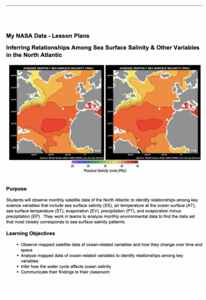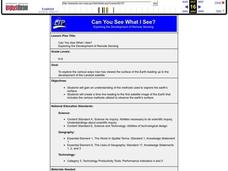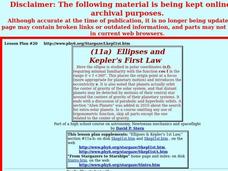NASA
Earth’s Energy Budget - Seasonal Cycles
Earth's energy budget should be in the red. Young researchers review satellite data in a presentation to study Earth's solar radiation. They make both qualitative and quantitative observations about variations in available seasonal...
NASA
Inferring Relationships Among Sea Surface Salinity & Other Variables in the North Atlantic
Some say a picture is worth a thousand words—even from a hundred miles away! Learners review satellite data to analyze ocean variables such as temperature, salinity, evaporation, and precipitation. They look for patterns in the data and...
Curated OER
What Color is the Ocean?
Students view satellite pictures of the ocean, and discuss the presence of phytoplankton and the colors of the ocean. Students compare/contrast ocean satellite images with maps and globes, then color world maps to replicate the satellite...
Curated OER
Show Me the Way To Go Home
Students place a pencil perpendicular to the ground and trace its shadow between 11:30 AM and 12:30 PM. They measure the length of the shadow, periodically over several hours, in either English or Metric units. Using the data, they find...
Curated OER
Teaching Atomic Structure Using Cooperative Learning
Individuals in a group of four each take on a different role: atomic number expert, mass number expert, isotope expert, and nuclear atom expert. They teach each other about their area of expertise. As an assessment, a short quiz is...
Curated OER
Space Exploration - Boom or Bust?
In this space exploration worksheet, students will label if 5 statements support space exploration or not. Then students will complete 2 short answer questions giving their opinion about three things that are good and three things that...
Curated OER
How Much Is That Camera in the Window?
Students classify cameras by type and price. Analyzing newspaper ads, magazines, and catalogs, students compare kinds and brands of cameras. Excellent links and resources are also provided.
Curated OER
Can You See What I See?
Students gain an understanding of the methods used to explore the earth's surface. Students create a time line leading to the first satellite image of the Earth that includes the various methods utilized to observe the earth's surface.
Curated OER
Where Do I Live?
Students gain a better understanding of the population of the region they live in by comparing U.S. census data on the internet.
Curated OER
What's The Weather?
Students explore the role that remote sensing plays in predicting our weather. Students investigate weather websites, and read about the three kinds of clouds. Students record and draw their observations in science journals.
Curated OER
Trees of Mississippi
Students research tree species found in Mississippi, and record the tree types, numbers of trees, and locations. Students then research the forest industry sites, and determine possible relationships between industry location and tree...
Curated OER
Volcanoes in Space
Students research volcanoes on the Internet to compare/contrast the volcanoes on Earth to the ones found on Io, a moon of Jupiter. Students list the similarities and differences in science journals, and illustrate pictures of the volcanoes.
Curated OER
Amelia the Pigeon: Lesson 1
Students listen to the story, Amelia the Pigeon, predicting Amelia's story and creating their own stories of Amelia's flight using pictures of New York City. They build views of their neighborhood by pulling together drawings from the...
Curated OER
Sequencing From Close To Far
Students explore how objects stay the same size and only "look" like they change when closer are farther from the object. They sequence aerial photos and satellite images from closest to farthest.
Curated OER
Introducing NatureMapping
Young scholars model the NatureMapping program in order to study habitats and biodiversity.
Curated OER
Introducing Habitats and Biodiversity
Learners identify habitats in Arizona. Theys define and illustrate a food web, and explain the importance fo biodiversity.
Curated OER
What Color is It?
Young scholars indentify whether an objects reflects or absorbs red, green, and/or blue light. They create a simple spectral signature.
Curated OER
Vectors
High schoolers listen to a lecture and complete a number of problems as they go. There are a variety of examples given and they are guided through the problem solving steps for each of the real-world scenarios regarding the purpose of...
Curated OER
Radiation Budget Lesson: Exploring Albedo
Students experiment with sunlight and temperature. They study the definition of albedo, or the percentage of incoming sunlight that is reflected, rather than absorbed.
Curated OER
Ellipses and Kepler's First Law
The class examines graphs in the form r = F(¿¿) in polar coordinates (r, ¿¿), in particular with the circle, ellipse and other conic sections. They determine the nature of an ellipse by studying the role of the semimajor axis and...
Curated OER
Cloud Poems
First graders make daily observations about clouds, write in their cloud books, make cloud charts, and make a poem about clouds.
Curated OER
Air Pressure is Powerful
Students make a barometer and write a paragraph describing how they did it.
Curated OER
Using Computer for Statistical Analysis
High schoolers use the computer and S'COOL data for statistical analysis.
Other popular searches
- Nasal Passages
- About Nasa
- Nasa Planets
- Nasa Robots
- Nasa Lesson Math
- Nasa Aircraft
- Nasa Materials
- History of Nasa
- Nasa Lesson Plans
- Nasa Web Based Textbook
- Nasa Aurora
- Contributions of Nasa

























